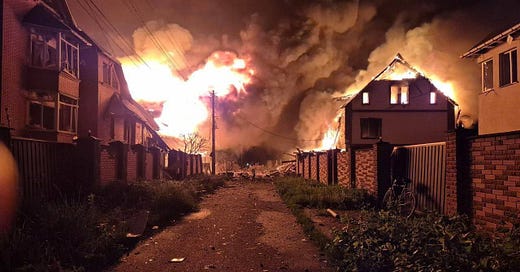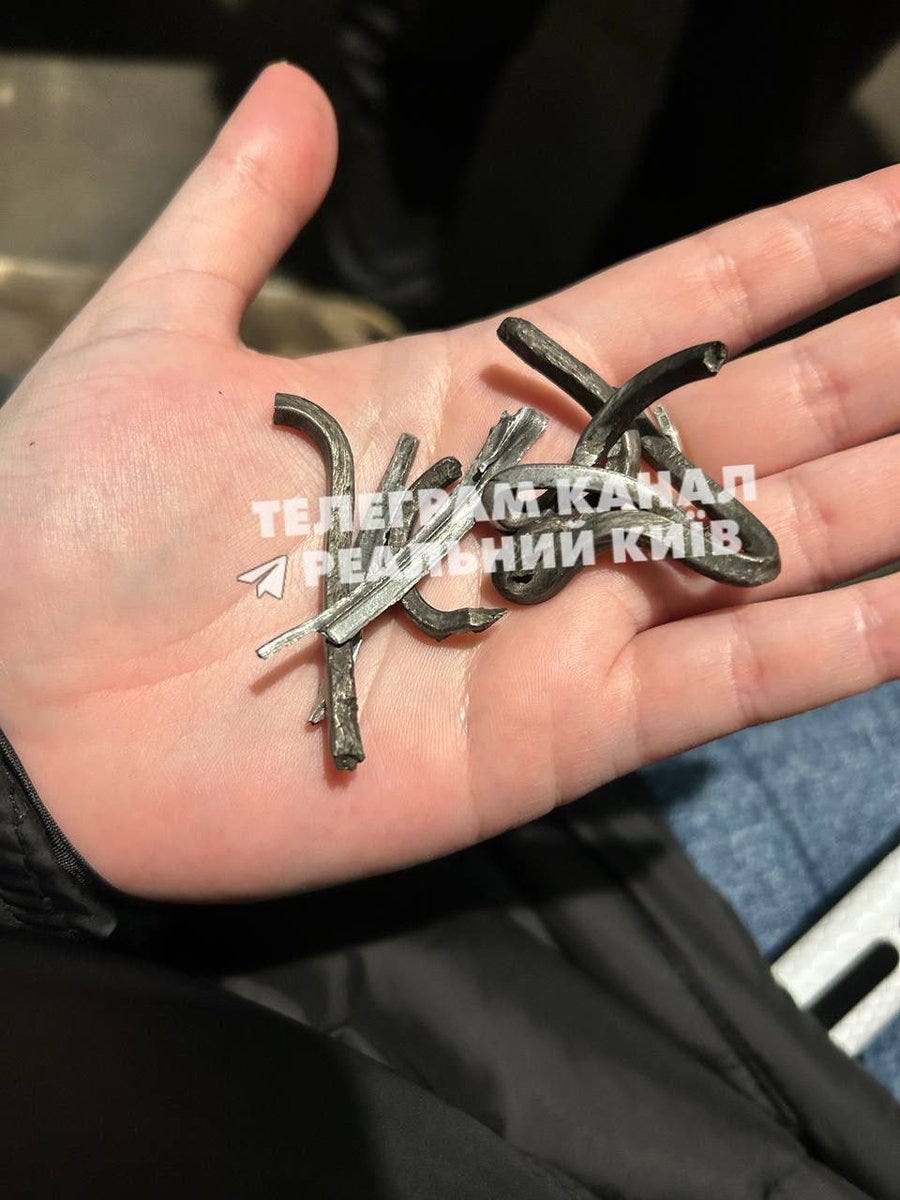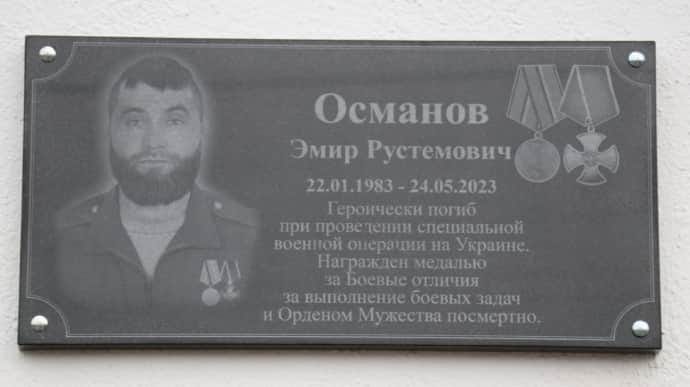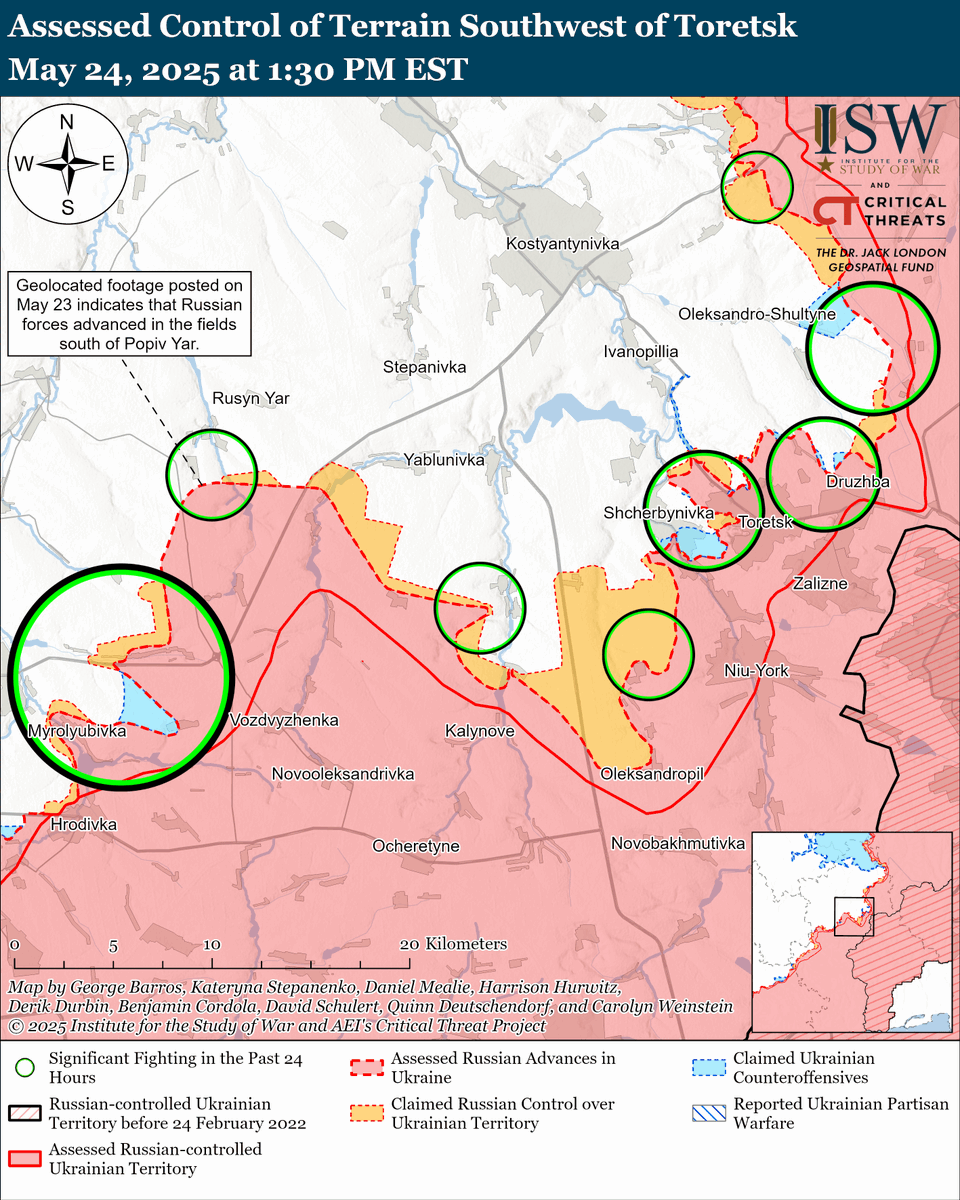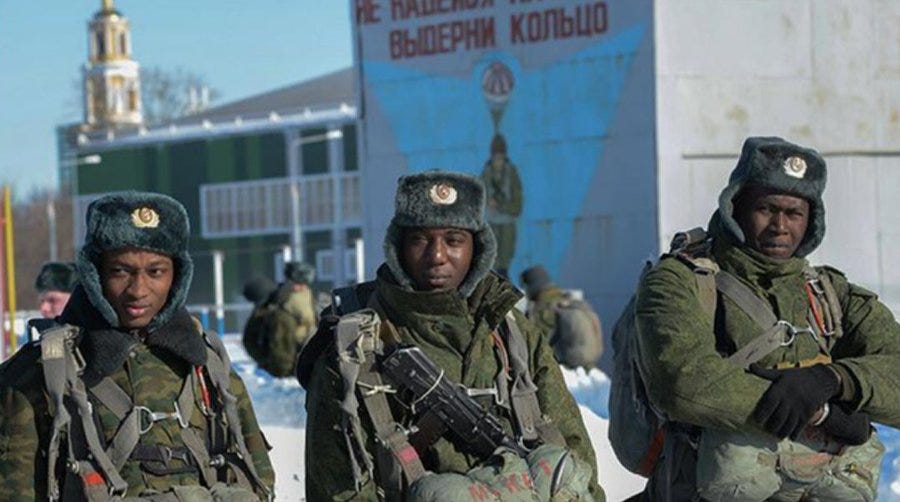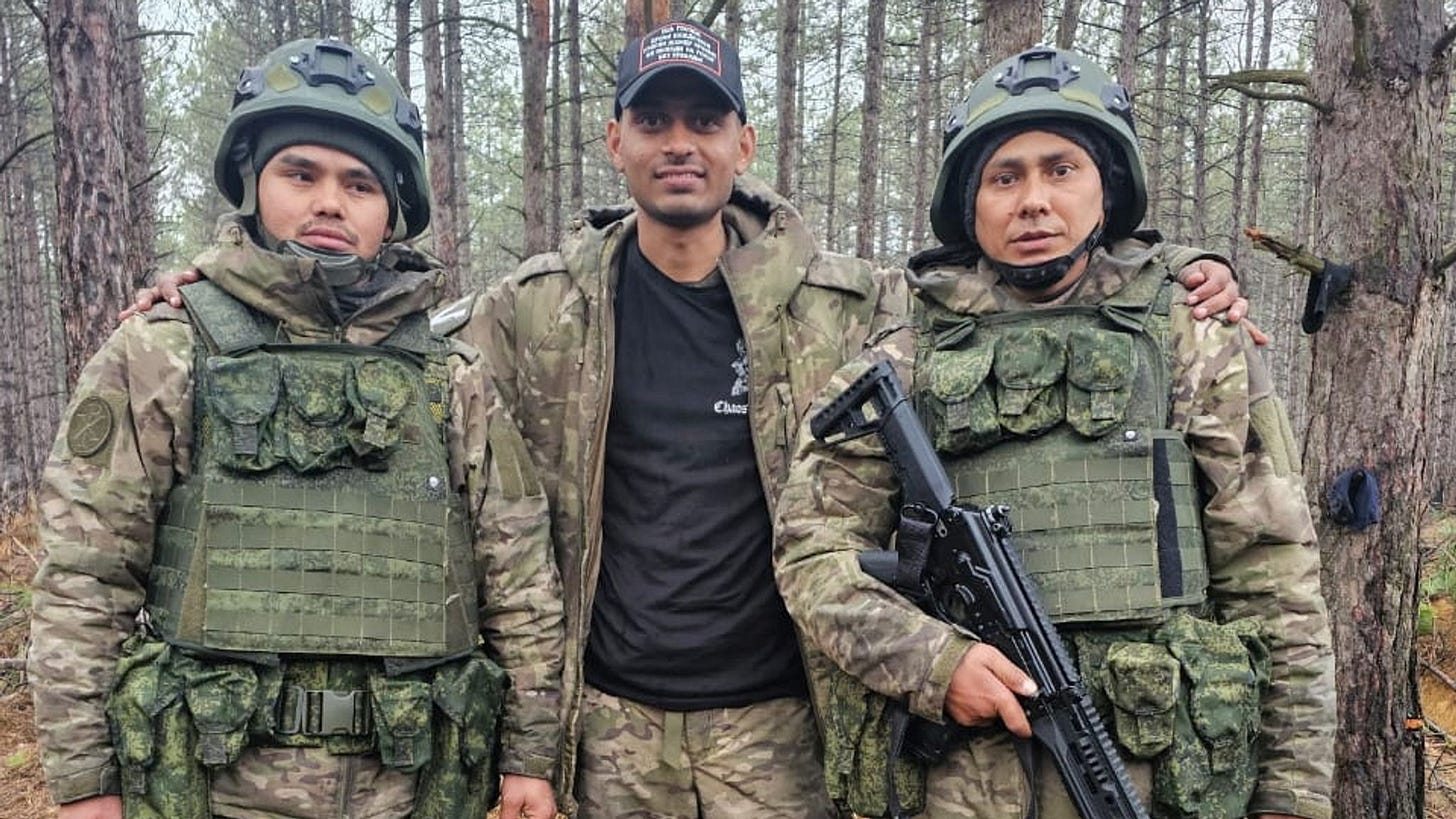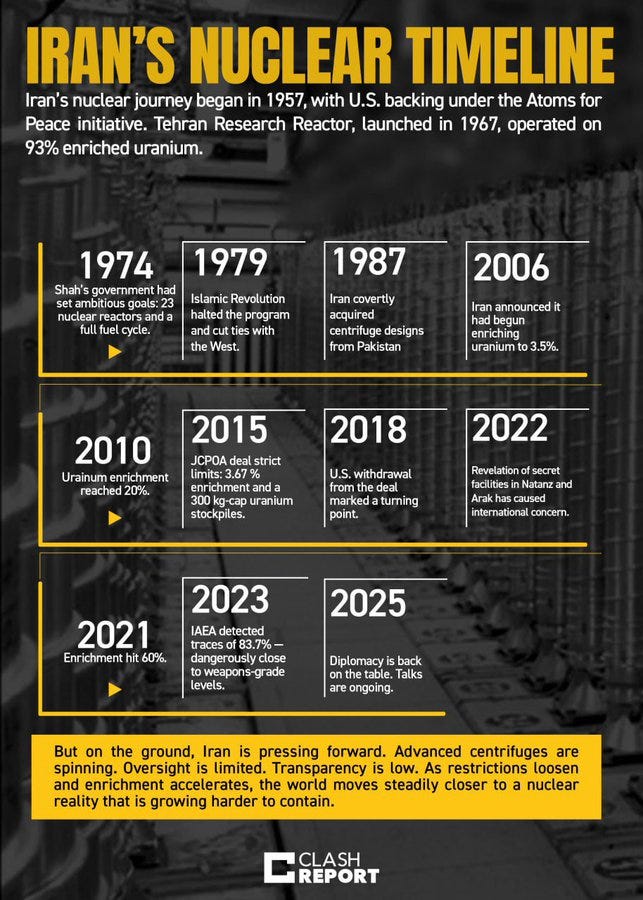Catching up…
For specific news about Trump, his regime and its dealings with Russia, I direct you to Olga’s substack. She and Julie Roginsky publish a weekly podcast, “Pax Americana”, which is highly informative.
For a general view of news from various geopolitical threatres, Scott’s EA Worldview is always superb.
Let’s get going…
Stories we’re following…
President Zelensky confirmed that 303 Ukrainian POWs have been returned from Russia in the final stage of the prisoner exchange: “Today, warriors of our Armed Forces, the National Guard, the State Border Guard Service, and the State Special Transport Service are returning home,” he said in a post on Telegram.
I cannot imagine what this woman and her husband and family have gone through for three years.
During the night of May 24 over the skies in Ukraine, one of the largest Russian airborne strikes hit a multitude of civilian targets: in this video, the moment a Shahed drone strikes Ukrainian civilians as they are running to the shelter.
22:28 pm CET: Up to 8 Tu-95MS bombers are airborne, heading toward launch zones near Engels, Saratov region (ETA ~02:00) and the Caspian Sea (~03:00-03:20). Meanwhile, 2 Russian missile carriers are active in the Black Sea, and explosions were already reported in Odesa.
Affected cities and regions: Kyiv, Kyiv region, Zhytomyr, Ternopil, Dnipro, Mykolaiv, Odesa, Sumy, Kharkiv, Khmelnytskyi and Chernihiv—killing 12 people (including 3 children in Zhytomyr) and wounding 44. Homes, schools, malls and infrastructure were damaged across the country.
Ukraine’s Air Force confirms that the UAF were able to shoot down 45 cruise missiles (Kh-101/Kalibr) and 266 drones (incl. Shahed). Shot down:
45/55 Kalibr/Kh-101 cruise missiles
0/9 Iskander-M/KN-23 ballistic missiles
0/1 Kh-22 cruise missile
0/4 Kh-59/69 cruise missiles (2 didn't reach target)
266/298 Shahed/simulator drones
Zelensky after Russia’s massive overnight attack:
"Almost 300 Shahed drones and 70 missiles hit Ukrainian cities—Kyiv, Zhytomyr, Odesa, Khmelnytskyi, and more. Homes, dorms, businesses destroyed. Children killed.
Every strike is reason for tougher sanctions. Silence only encourages Putin. Pressure must be real—now."
Rescuers have been working in more than 30 Ukrainian cities and villages following Russia’s massive strike. Wherever necessary, work continues – our emergency services are on the ground, providing assistance and supporting people. Thank you.
The drones that attacked Kyiv at night were equipped with metal objects to make them more deadly. The damage radius and the number of potential civilian casualties are increasing., local media reported.
Makariv, the Kyiv region: the entire small town neighborhood was destroyed. Maria Avdeeva reports statements by Svitlana Roiz of Markakiv, a renowned child psychologist, whose husband is serving on the front lines:
“We’re alive.
For the first time since the war began, a blast knocked me to the floor. Something shattered in the house — but we still don’t dare go upstairs.
There’s a red glow outside the window. I just hope people are alive.
I already know half the street in our village is gone. We’re calling out to neighbors, asking what’s been destroyed.
My daughter has calmed down. Now I just need to find the cat.”

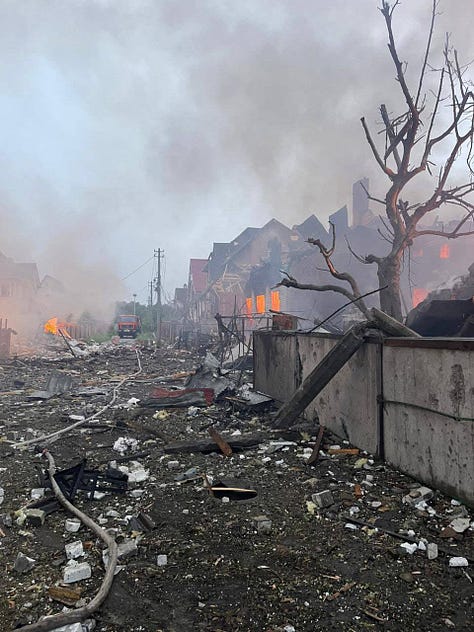
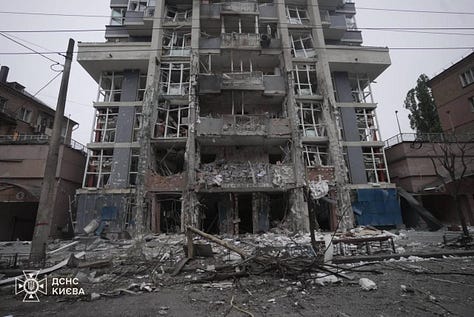
ISW: Russian forces appear to be reducing their use of cruise missiles, indicating that increased Russian drone production and innovations to long-range drones and related strike tactics are providing Russian forces with a cheaper alternative to cruise missiles
Russia's upgraded ballistic missiles harder to intercept by Patriots, Air Force says. "It complicates (the interception), but doesn’t make the interception impossible," Ukraine's Air Force spokesperson Yurii Ihnat said. "I think our partners are already working to improve the system's capabilities."
Ukrainian drones shot down near Moscow as Russia attacks Kyiv, official claims. Six drones were shot down as they flew towards Moscow, Mayor Sergey Sobyanin said on May 25. His report came as Russia attacked Kyiv for the second consecutive night.
Russia claims its air defences intercepted and destroyed 110 Ukrainian drones overnight on 24-25 May over the regions of Tula Oblast, Bryansk and Kaluga oblasts, Moscow and Tver oblasts, Belgorod and Kursk oblasts, Oryol Oblast, Smolensk Oblast and Lipetsk, Nizhny Novgorod and Novgorod oblasts.
A large-scale project is underway in Russian-occupied Crimea to rename schools in honour of Russian "heroes" of the war against Ukraine, referred to by Russia as the "special military operation", and the Soviet army, under the initiative titled a hero’s name for a school, as reported by Krym.Realii. Local activists report that over 200 schools in Crimea have been renamed.
"The Russian occupation authorities in Simferopol, Sudak, Dzhankoi, Kirovskyi, Rozdolne and Chornomorskyi districts are the most actively involved.
In Simferopol, the Russian-installed City Council decided to rename 27 schools. For example, School No. 38 was renamed in honour of Vladislav Dorokhin, a so-called ‘hero of the special military operation’. Memorial plaques, memory corners, historical displays and museums are being established in schools, and ‘patriotic clubs’ are being organised."
Combat Situation
“[T]he rate of Russia’s advance on the ground has been slowed to a near-standstill, in part because of Ukraine’s fortification of a 10-mile defensive zone littered with mines and trenches and the use of short-range drones to attack any Russian approach to the front lines.”
On May 24, Ukraine’s military intelligence struck a Russian fuel train in occupied Zaporizhzhia region, hitting it in motion on the Verkhnii Tokmak–Molochansk–Fedorivka rail line. At least three fuel tanks were destroyed.
Ukraine denies Russian presence in Sumy Oblast border village, media reports. Earlier, Russia's state-run news agency TASS claimed that Russian forces had entered Yunakivka, a village near the Russian border in Sumy Oblast.
Russia losing battlefield edge in war against Ukraine, WP reports. Moscow faces critical shortages of weapons and manpower, making the time ripe for escalated pressure, Western officials told The Washington Post (WP).
There are claims that Russia has amassed 50,000 troops near Kharkiv, which is Ukraine's 2nd largest city with a population of 1.4 million, located just 17 miles (27 km) from the border.
ISW: Russian forces have significantly expanded their salient southwest of Kostyantynivka in recent weeks and established sufficient positions to launch an offensive operation toward Kostyantynivka from the south or to support the envelopment of Pokrovsk and Myrnohrad from the northeast in the coming weeks and months. The area is necessary for the Russians to make further advances.
Russian forces will be able to leverage this salient to advance further along the T-0504 Pokrovsk-Kostyantynivka highway from the south toward Kostyantynivka as Russian forces contend with Ukrainian defenses west of and along the Kleban-Byk reservoir.
Russian chemical plant, missile parts manufacturer targeted in alleged Ukrainian drone strike. The Energia facility, which lies in the Lipetsk Oblast city of Yelets, was attacked for the second night in a row, with residents reporting at least five explosions overnight, Astra reported.
Le Monde: A Russian deserter living in Paris copied three gigabytes of “top-secret information” belonging to two Russian divisions and shared it with Le Monde.
He estimates that barely 20% of the troops on the ground were convinced by Putin’s comments about the Ukrainians. Most of them secretly mock Putin, believing him to be weaker than he appears.
They also claim to not really understand the objectives of the “operation” or why the war has lasted so long. He acknowledges that Russia is “getting bogged down in a war of attrition against the Ukrainian resistance”. Despite advancing just a few kilometres, the Russian troops are unable to launch any major manoeuvres.
Behind the Lines
Kyiv Insider: Ukraine Is Turning Western Gamers into Elite Drone Pilots—and Russia Is Paying the Price
From places like Bristol, UK and San Diego, California and Nashville, Tennessee, some of west’s best video gamers are building a an elite Ukrainian drone force. An innovative program has been bringing gamers volunteers to Ukraine for a 3-week drone training course, with results devastating for the Russian military. Armed with fast reflexes, FPV goggles, and precision-built drones, these volunteers are being transformed into some of Ukraine’s most effective battlefield assets.
The training program selects individuals with experience in first-person shooters and racing games—skills that align seamlessly with First Person View (FPV) drone piloting. One recruit, a 25-year-old American gamer identified as “T,” told The Independent that his time with Call of Duty and Gran Turismo helped sharpen the instincts now used in combat. “I’ve trained my reflexes for years playing online,” he said. “Now I use that muscle memory to hit real targets.”
Volunteers from countries including the U.S., U.K., Canada, Australia, and France bring backgrounds in gaming, engineering, and technology. After an initial three-week selection process, top candidates complete six weeks of tactical and operational training before being deployed to frontline units.
Once in the field, these drone pilots operate explosive-laden FPV drones that strike Russian military assets with speed and accuracy. Drones that cost a few hundred dollars are disabling or destroying vehicles and equipment worth millions. Ukrainian officials credit these strikes with disrupting Russian movements, slowing resupply, and forcing Moscow to shift strategy.
The Slovak National Party (SNS), a coalition partner, has claimed that Slovakia has the right to demand financial compensation from Ukraine for its assistance—Slovak news agency TASR, as reported by European Pravda, citing Teraz news portal. Zuzana Škopcová, director of the office of the SNS chairman, stated that the party urges Prime Minister Robert Fico (Smer-SD) to propose, at the next European Council meeting, that the EU secure a share of Ukraine’s mineral wealth.
Former US Ambassador to Ukraine interviewed by Christiane Amanpour: "I think that Putin is stringing us along," warns former US Ambassador to Ukraine Bridget Brink, who recently resigned in protest over Trump's Ukraine policy. "It's really important... to put more pressure on Russia," she says.
Ambassador Brink was heavily criticised when the Trump administration took office for her support of some of Trump’s inappropriate comments. She resigned from her post, and set the record straight in subsequent interviews—here with PBS.
Meanwhile in Russia & China…
Turkish FM Hakan Fidan will reportedly visit Russia today to discuss the situation in Ukraine following talks in Istanbul. He is expected to convey Türkiye’s interest in a lasting and just peace.
Georgia has imposed a complete ban on the export of passenger cars and special equipment from the country for citizens of Russia and Belarus since May 15. This was reported by the BM.GE portal with reference to the Service Agency of the Ministry of Internal Affairs of Georgia. As explained on the agency's hotline, re-export to Russia and Belarus was already prohibited before the new rules came into force. However, previously there were no restrictions for citizens of these countries when exporting equipment to third countries. Since May 15, according to the agency, the conditions have changed.
In the first quarter of 2025, imports of foreign wine to Russia fell by half, RIA Novosti calculated based on data from national statistical agencies. The largest decline was in imports of Spanish products, with supplies falling year-on-year from $10.9 million to $2.2 million (the country moved to 9th place and dropped out of the list of the largest wine suppliers to Russia).
Despite a significant decline in export volumes, Italy remained the largest supplier of wine to Russia in the first quarter: the figure fell to $32.4 million (2.8 times). Imports from Georgia decreased by 2.4 times, amounting to $27.6 million, and from Latvia — by 10% ($25.4 million). Poland is in fourth place with a volume of $9.8 million (a decline of 1.8 times).
Imports of Portuguese wine fell by a third to $6.2 million, but the country replaced Spain in the list of the largest suppliers. Chile imported wine for $5.2 million, Lithuania for $3.8 million, Germany for $3.3 million, and France for $0.7 million, according to calculations.
Speaking of wine, from The Insider: The Tuscan winery Fattoria della Aiola was first linked to Dmitry Medvedev by the late Alexei Navalny’s Anti-Corruption Foundation (FBK) back in 2017. At that time, the Italian business was registered under the Cypriot offshore company Furcina Ltd, owned by Ilya Eliseev — a classmate, trusted confidant, and close friend of Medvedev’s. Since then, the ownership structure of the Italian company Fattoria Dellа Aiola Societa Agricola A.R.l. has changed: instead of one Cypriot offshore entity, another has emerged, with part of the shares now held directly by Eliseev, as confirmed by The Insider.
Despite the EU and US sanctions against billionaire Oleg Deripaska that have been in place since 2022, and statements of commitment from the Montenegrin authorities, the Russian oligarch continues to be a secret investor in real estate in the republic, Novaya Gazeta reports .
At the beginning of the year, the Ministry of Planning and Urbanization of Montenegro issued a permit to KPM to build a five-star hotel in the Trsteno beach area near Budva. According to the approved project, the tourist complex will be located above the Trsteno beach (Kotor municipality). It will include the main building of the five-star hotel, with 819 parking spaces. In the conclusion, acting Chief State Architect Mirjana Djurisic emphasized that the project will ensure "exclusivity of the seaside tourist complex."
Ukrainer: Russia is running a global scheme to lure, coerce, and traffic migrants and students into its war on Ukraine—using fake jobs, passport traps, and threats. Recruits come from over 20 countries. Most get no training, no pay, and no way out.
In April 2025, Ukraine captured two Chinese nationals fighting for Russia — part of over 155 identified on the front lines. This script is not rare: according to UK intelligence, Russia has recruited over 1,500 fighters since April 2023, mainly from across the Global South.
Many are misled, trained through hand signals, and used as expendable cover for Russian troops, with over 300 confirmed deaths among foreigners – although the real number is likely much higher.
Moscow targets vulnerable migrants, offering army contracts at migration centers in exchange for fast-track passports. Rights activists report police detain migrants and threaten them with deportation unless they agree to fight.
The same tactics target foreign students, especially over 40,000 African students, who face visa threats if they don’t enlist. Once recruited, their student status is often revoked, stripping students of protections and making them unable to leave the country.
This system extends beyond Russia into Africa. Through fake job ads, Russia’s “Alabuga Start” recruits young women to work at a drone plant supplying the war in Ukraine. Conditions are harsh—unregulated hours, toxic materials, and work that violates their own labor laws.
In South Asia, recruitment reached a crisis point. In India, the crisis hit the highest level: Prime Minister Modi personally confronted Putin in 2024, forcing Russia to halt the recruitment of Indians and release those on the front.
Likewise, Sri Lanka sent a high-profile delegation to Russia to investigate the fate of its 17 killed recruits and release the rest. In Nepal, whose 15,000 citizens ended up in the Russian army, the government banned all work travel to Russia altogether.
Beyond fake job offers, Russia openly recruits in active war zones, offering well-paid jobs and fast-track citizenship which ties them to military draft. In Yemen, Iran-backed Houthis recruited men via trafficking networks close to the Houthi leadership.
Once deployed, foreign recruits face Russia’s assaults with little training, no interpreters, and almost no medical care, driving high death rates. Many are denied promised pay and listed as “missing” when killed—erased without accountability or compensation.
In Europe…
Nicușor Dan travels to Poland to support Warsaw's mayor in the presidential elections: “On my last day before becoming president, I was invited by my Polish colleagues to attend an electoral event supporting the democratic candidate, the mayor of Warsaw, in the presidential elections”.
Mo: this could be used by his opponent, Karol Nawrocki, in propaganda operations citing foreign interference by Romania to the benefit of Rafał Trzaskowski. I don’t think the intent is nefarious; at the same time, foreign leaders should not be participating in the election campaigns of foreign candidates.
Mo: Chancellor Merz’s attempt to bring president Xi to the western alliance against Russia’s war against Ukraine will not bring any results. The Chinese are sustaining Russia’s war effort and have also expanded their reach to the Houthis and other insurgent groups. There is no incentive for China to act against its own well-documented foreign policy, which aims to destabilise the US and its allies, and expand its economic, political and physical trade and surveillance routes wherever it can.
Italy’s FM Antonio Tajani: “The war in Ukraine won’t end this year. Russia has shifted its industry to arms production, pays soldiers double that of workers, and has a million troops on the battlefield. Pressure on Putin must double — Russia must abandon the path of war.”
Mo: it’s good to read that the Italian FM is finally saying something noteworthy. Tajani has chaired meetings with the Russian-Italian Business Association, which lobbies to get sanctions lifted from Russia so that Italian businesses doing business with Russia can resume commerce. Italian entrepreuners that have not closed their activity in Russia were also present, lobbying for financial aid from the Italian government or measures to facilitate their activities in Russia.
Germany's defense minister Boris Pistorius says his country may reinstate compulsory military service. "If the time comes when we have more capacity available than voluntary registrations, then a decision may be made to make recruitment mandatory. That is the roadmap".
The EU may buy U.S. weapons for Ukraine — Bloomberg. Amid Trump’s reluctance to back Kyiv and Europe’s limited stockpiles, EU leaders are considering purchasing American arms to supply the Ukrainian military.
Bloomberg: Giant US Companies Are Rushing to Europe to Borrow Money. A record number of so-called reverse Yankee deals have been sold this year, an early sign of a possible lasting shift in the US-dominated corporate debt market.
The giants of corporate America from Pfizer Inc. to Alphabet Inc. are borrowing in euros like never before as the anxiety triggered by President Donald Trump’s tariff threats pushes them to hunt for alternative funding avenues in case their home market freezes up.
A record number of these so-called reverse Yankee deals have been sold this year at a total value of more than €83 billion ($94 billion), up 35% on 2024, according to data compiled by Bloomberg. That’s nearly 14% of overall euro corporate issuance, the data shows.
In other news…
I hadn’t realised that making America great again means selling off what you can, including access to the president.
President’s crypto event for $TRUMP meme coins. In this clip, Jeff Zeleny's report on Trump's crypto dinner, including H.E. Justin Sun, the Chinese billionaire who is the largest investor in Trump's memecoin. Trump appeared for a little over 23 minutes at the event, stood at the presidential podium, and then left.
WSJ’s reporting on the Crypto Dinner: Crypto entrepreneurs from across the world traveled to the Washington, D.C. area this week to attend an exclusive dinner with President Trump. WSJ pulls back the curtain on the high-profile affair.
The U.S. President plans to hold the event on June 14th — his 79th birthday, which coincides with the 250th anniversary of the U.S. Army. Preparations are already underway, with authorities expecting large crowds, heavy security, and potential protests. Supporters hail the parade as a show of national pride, while opponents accuse Trump of turning a military celebration into his own campaign spectacle.

